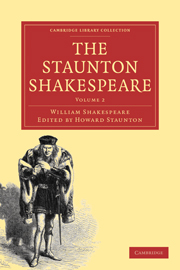Book contents
- Frontmatter
- Contents
- ALL'S WELL THAT ENDS WELL
- KING HENRY THE FIFTH
- AS YOU LIKE IT
- PERICLES, PRINCE OF TYRE
- TWELFTH NIGHT; OR, WHAT YOU WILL
- THE FIRST PART OF KING HENRY THE SIXTH
- THE SECOND PART OF KING HENRY THE SIXTH
- THE THIRD PART OF KING HENRY THE SIXTH
- TIMON OF ATHENS
- KING RICHARD THE THIRD
- MEASURE FOR MEASURE
- KING HENRY THE EIGHTH
- CYMBELINE
THE FIRST PART OF KING HENRY THE SIXTH
Published online by Cambridge University Press: 29 August 2010
- Frontmatter
- Contents
- ALL'S WELL THAT ENDS WELL
- KING HENRY THE FIFTH
- AS YOU LIKE IT
- PERICLES, PRINCE OF TYRE
- TWELFTH NIGHT; OR, WHAT YOU WILL
- THE FIRST PART OF KING HENRY THE SIXTH
- THE SECOND PART OF KING HENRY THE SIXTH
- THE THIRD PART OF KING HENRY THE SIXTH
- TIMON OF ATHENS
- KING RICHARD THE THIRD
- MEASURE FOR MEASURE
- KING HENRY THE EIGHTH
- CYMBELINE
Summary
The first edition of this play known, is that of the folio 1623. It is generally supposed to be the same “Henery the vj.,” somewhat modified and improved by Shakespeare, which is entered in Henslowe's diary as first acted on the 3rd of March, 1591–2, and to which Nash alludes in his “Pierce Pennilesse, his Supplication to the Devil,” 1592 :— “How would it have joy'd brave Talbot (the terror of the French) to thinke that after he had lyne two hundred yeare in his tombe, he should triumph againe on the stage, and have his bones new embalmed with the teares of ten thousand spectators at least, (at severall times,) who, in the tragedian that represents his person, imagine they behold him fresh bleeding.” This opinion has, however, been strenuously impugned by Mr. Knight, in his able “Essay on the Three Parts of King Henry VI. and King Richard III.,” wherein he attempts to show, that the present drama, as well as the two parts of the “Contention betwixt the two famous houses of Yorke and Lancaster,” which Malone has been at such infinite pains to prove the works of earlier writers, are wholly the productions of Shakespeare.
The subject is of extreme difficulty, and one upon which there will always be a conflict of opinion. For our own part, we can no more agree with Mr. Knight in ascribing the piece before us solely to Shakespeare, than with Malone in the attempt to despoil him of the two parts of the “Contention.”
- Type
- Chapter
- Information
- The Staunton Shakespeare , pp. 283 - 336Publisher: Cambridge University PressPrint publication year: 2009First published in: 1859

